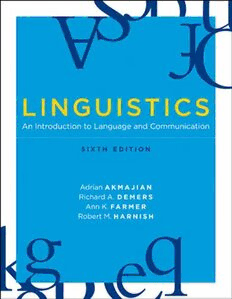
Linguistics: An Introduction to Language and Communication, Sixth Edition PDF
645 Pages·2010·7.638 MB·
Most books are stored in the elastic cloud where traffic is expensive. For this reason, we have a limit on daily download.
Preview Linguistics: An Introduction to Language and Communication, Sixth Edition
Description:
This popular introductory linguistics text is unique for its integration of themes. Rather than treat morphology, phonetics, phonology, syntax, and semantics as completely separate fields, the book shows how they interact. It provides a sound introduction to linguistic methodology while encouraging students to consider why people are intrinsically interested in language--the ultimate puzzle of the human mind. The text first treats such structural and interpretive parts of language as morphology, phonology, syntax, and semantics, then takes a cognitive perspective and covers such topics as pragmatics, psychology of language, language acquisition, and language and the brain. For this sixth edition, all chapters have been revised. New material includes updated examples, new special topics sections, and new discussions of the minimalist program, semantic minimalism, human genetic relationships and historical relationships among languages, Gricean theories, experimental pragmatics, and language acquisition. The organization of the book gives instructors flexibility in designing their courses. Chapters have numerous subsections with core material presented first and additional material following as special topics. The accompanying workbook supplements the text with exercises drawn from a variety of languages. The goal is to teach basic conceptual foundations of linguistics and the methods of argumentation, justification, and hypothesis testing within the field. By presenting the most fundamental linguistics concepts in detail, the text allows students to get a feeling for how real work in different areas of linguistics is done.
See more
The list of books you might like
Most books are stored in the elastic cloud where traffic is expensive. For this reason, we have a limit on daily download.
